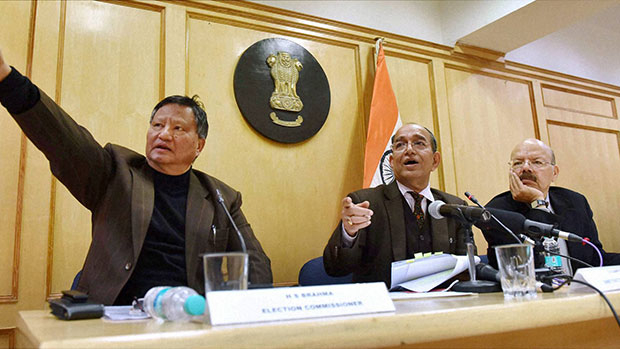
New Delhi: India’s Election Commission on Monday announced Delhi legislative assembly election will be held on February 7.
Chief Election Commissioner V.S. Sampath announced notification to hold polls would formally be declared by the Delhi Lieutenant Government Najeeb Jung on Wednesday. The aspiring candidates get one week’s time to file nominations. Counting of votes will be taken up on February 10.
Nearly 13 million voters will be eligible to exercise their right to vote at 11,763 polling booths to elect the 70-member assembly.
According to Sampath, polling booths will be mostly set up on ground floors and ramps would be provided to ensure old and physically challenged people face no difficulty in voting.
Candidates will have to fill up all columns in the nomination paper. The returning officer will contact them if any column is left blank and the candidate’s nomination is liable to be rejected if any column is left blank.
The model code of conduct comes into effect immediately and observers will start monitoring with immediate effect.
Sampath also announced a separate schedule to fill up one existing Lok Sabha vacancy and one assembly seat each in Arunachal Pradesh, Goa, Tamil Nadu, West Bengal, Maharashtra and Andhra Pradesh. The
lone Lok Sabha seat that is going to poll is West Bengal’s Bangaon seat, which fell vacant following death of Kapil Krishna Thakur of the state’s ruling Trinamool Congress party. Voting in all these constituencies will take place on February 13 and votes would be counted on February 16. The model code of conduct for the by-elections would be confined to the district concerned only.
According to Sampath adequate arrangements of state and central police forces would be made to ensure peaceful polling.
This is the second time in 13 months when Delhi-item would be voting as they elected a hung assembly in December 2013. The Bharatiya Janata Party (BJP), which had emerged as the single largest party with 31 seats, refused to form the government, leading to the debutant Aam Aadmi Party (AAP) that had emerged the second largest party with 28 seats forming the government with outside support of the Congress party. The AAP supremo Arvind Kejriwal resigned as the chief minister after being in power for 49 days. Delhi has since February last year been under President’s Rule.
The AAP has already taken lead over its rivals as it has announced its candidates for all 70 seats. Kejriwal will seek re-election from New Delhi assembly constituency and may face a new rival as former chief minister Sheila Dikshit of the Congress party has refused to contest this time.
Delhi would once again witness triangular contests in all seats with the Congress party trying to give fight to the BJP and the AAP.
Congress party named former federal minister Ajay Maken as chief of its campaign committee. Maken, who was defeated from his traditional New Delhi parliamentary constituency in general elections, is likely to contest for assembly to give a boost to the Congress party’s prospects. The party, which ruled Delhi for 15 years, sunk to an embarrassing low by winning just eight seats in 2013, followed by complete sweep by the BJP in all seven Lok Sabha constituencies of the metropolis.
“Congress [party] is non-existent in Delhi. I will be surprised if they open their account,” senior AAP leader Ashutosh saidadding it would be direct contest between the BJP and the AAP on all seats.
The BJP has decided against projecting its chief ministerial candidate and seek votes on the name of prime minister Narendra Modi. This strategy has paid the BJP rich dividends in various states that went to polls after Modi becoming prime minister in May last year. Modi kick-started BJP’s campaign by addressing a rally on Saturday and is likely to follow it up by addressing at least a dozen more rallies.
POLL SCHEDULE
Number of seats: 70, including 12 reserved for Scheduled Caste
Number of voters: 13 million
Number of polling booths: 11,763
Date of notification: January 14
Last date for filing of nominations: January 21
Scrutiny of nominations: January 22
Last date for withdrawal of nomination: January 24
Polling in all 70 constituencies: February 7
Counting of votes: February 10












